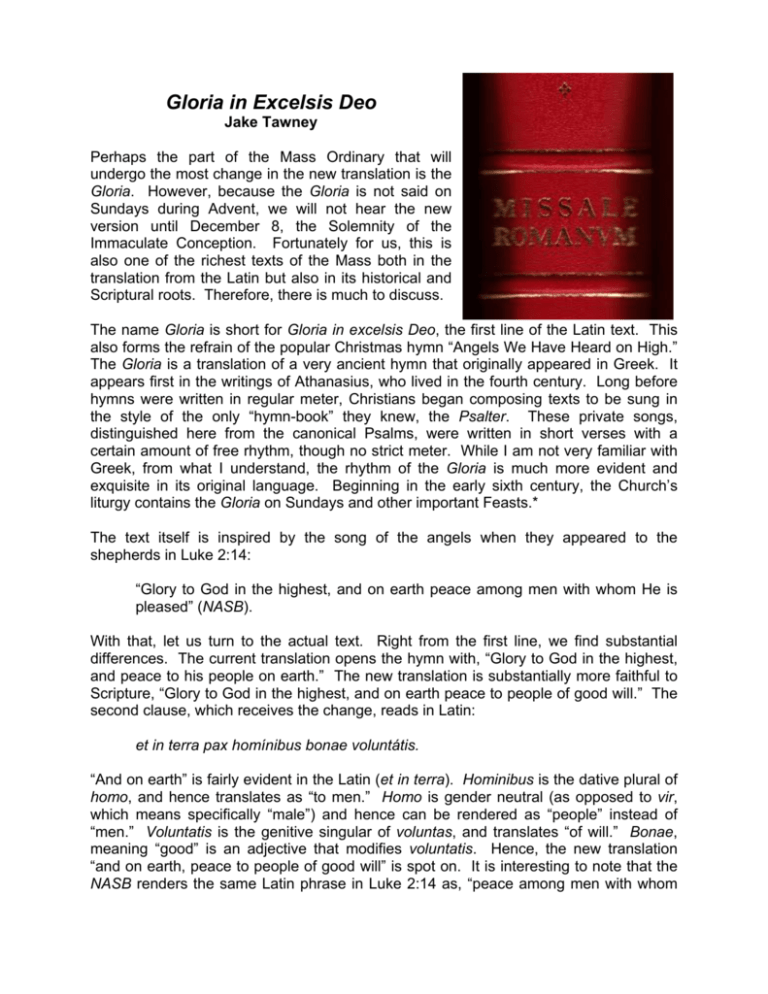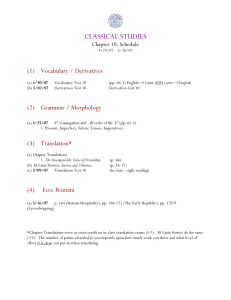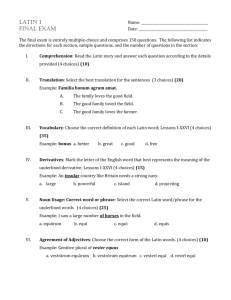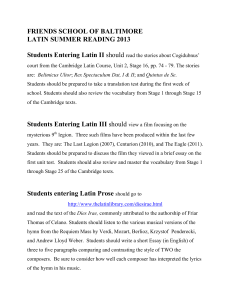Gloria in Excelsis Deo
advertisement

Gloria in Excelsis Deo Jake Tawney Perhaps the part of the Mass Ordinary that will undergo the most change in the new translation is the Gloria. However, because the Gloria is not said on Sundays during Advent, we will not hear the new version until December 8, the Solemnity of the Immaculate Conception. Fortunately for us, this is also one of the richest texts of the Mass both in the translation from the Latin but also in its historical and Scriptural roots. Therefore, there is much to discuss. The name Gloria is short for Gloria in excelsis Deo, the first line of the Latin text. This also forms the refrain of the popular Christmas hymn “Angels We Have Heard on High.” The Gloria is a translation of a very ancient hymn that originally appeared in Greek. It appears first in the writings of Athanasius, who lived in the fourth century. Long before hymns were written in regular meter, Christians began composing texts to be sung in the style of the only “hymn-book” they knew, the Psalter. These private songs, distinguished here from the canonical Psalms, were written in short verses with a certain amount of free rhythm, though no strict meter. While I am not very familiar with Greek, from what I understand, the rhythm of the Gloria is much more evident and exquisite in its original language. Beginning in the early sixth century, the Church’s liturgy contains the Gloria on Sundays and other important Feasts.* The text itself is inspired by the song of the angels when they appeared to the shepherds in Luke 2:14: “Glory to God in the highest, and on earth peace among men with whom He is pleased” (NASB). With that, let us turn to the actual text. Right from the first line, we find substantial differences. The current translation opens the hymn with, “Glory to God in the highest, and peace to his people on earth.” The new translation is substantially more faithful to Scripture, “Glory to God in the highest, and on earth peace to people of good will.” The second clause, which receives the change, reads in Latin: et in terra pax homínibus bonae voluntátis. “And on earth” is fairly evident in the Latin (et in terra). Hominibus is the dative plural of homo, and hence translates as “to men.” Homo is gender neutral (as opposed to vir, which means specifically “male”) and hence can be rendered as “people” instead of “men.” Voluntatis is the genitive singular of voluntas, and translates “of will.” Bonae, meaning “good” is an adjective that modifies voluntatis. Hence, the new translation “and on earth, peace to people of good will” is spot on. It is interesting to note that the NASB renders the same Latin phrase in Luke 2:14 as, “peace among men with whom He is pleased,” and the RSV translates it as, “and on earth peace among those whom he favors.” Both mean roughly the same thing as the literal translation of the Latin, that which is adopted by the new Missal translation, yet are not strictly speaking literal. Admittedly, voluntas can be rendered as “favor.” Then again, the English versions of Luke were not translated from the Latin text, but rather from Greek sources. My knowledge of Greek is not enough to speak on this; nevertheless, as it stands, the Latin version of the hymn is clearly best rendered as “men of good will.” Regardless, the current translation is currently deficient, as it fails to mention any reference to a subset of humanity, but rather speaks in unconditional universal terms, “peace to His people on earth.” The new translation speaks to the peace that Christ will bring, but also to the importance of our own acceptance. The past two-thousand years have shown that Christ did not bring universal peace on earth. Instead, he brings peace to the hearts of those who, with Christ, take up their cross and follow him. Those who live in accordance with the will of God will experience the promised grace, which brings with it a great interior peace. Thus, the new translation reflects not only the Latin and not only the Scriptural origins, but also the theological content of the angel’s message: the offer of peace is given to those who will receive, those of good will, not simply “people on earth.” (If you will indulge me a moment of foreshadowing: this issue is reminiscent of the controversy surrounding the translation of the words of consecration said over the chalice, rendering pro multis as “for many” rather than “for all,” to which we will turn in a future installment of this column.) Let’s compare what comes next in the Gloria. Currently, we hear, “Lord God, heavenly King, almighty God and Father, we worship you, we give you thanks, we praise you for your glory.” The new translation will read, “We praise you, we bless you, we adore you, we glorify you, we give you thanks for your great glory, Lord God, heavenly King, O God, almighty Father.” The Latin text is Laudámus te, benedícimus te, adorámus te, glorificámus te, grátias ágimus tibi propter magnam glóriam tuam, Dómine Deus, Rex cæléstis, Deus Pater omnípotens. The first four lines are probably the best example of a principle I have been trying to point out throughout this column: fidelity not only to the Latin vocabulary but also to the rhythm of the Latin. There is a beauty in the Latin form these line emply: four verbs in first-person-plural, and hence all with the -mus ending, followed by the second-personsingular pronoun te. Even a plain recitation of the Latin makes this beautiful rhythm clear; even more so does the Gregorian melody that accompanies the text. The only possible rendering of this in English that would preserve both vocabulary and rhythm is exactly what is given in the new translation. The only unfortunate thing about the English language is that the subject pronouns come first, so the emphasis begins on the “We” rather than the verb itself, as it does in Latin. In addition to moving “we worship you” into the middle of the next clause, we find the shocking fact that the current translation has removed three quarters of this rhythmic progression and reduced “We praise you, we bless you, we adore you, we glorify you,” to “We worship you.” (It does include the verb “praise” but incorrectly places it in the clause involving “your glory.”) Restoring the four verbs, taken together with the fifth one that comes with its own clause (“we praise you ...”), serves to remind us that, in every human way possible, using every form of action at our disposal, we render unto God what is due to him: our unconditional worship. We do this because everything that we have, everything that we are, comes from him. The clause that follows this poetic repetition is grátias ágimus tibi propter magnam glóriam tuam. Grátias ágimus tibi is a familiar Latin phrase for first-year students, though they usually see it in the singular. We saw something similar in our discussion of the Preface Dialog a few weeks back. It is a way of saying “Thank you,” or in this case, “We give you thanks.” Propter magnam gloriam tuam translates literally “on account of [for] your great glory,” and so the new translation is accurate. I would say that it is curious that the current translation leaves off the adjective “great” were it not for the fact that, as we just saw, it leaves off entire clauses in the rest of the hymn. The only other minor change in this first part is the restoration of Deus Pater omnípotens to “O God, almighty Father,” rather than “Almighty God and Father.” The current translation is entirely inaccurate, but once again the new is more faithful to the rhythm of the Latin, which doesn’t contain the conjunction “and.” Because the Gloria is quite lengthy and has several changes, we will not try to accomplish all of it in one post. Next week we will take up the rest of this ancient hymn. * The Mass: A Study of the Roman Liturgy, Adrian Fortesque: page 239-242.





